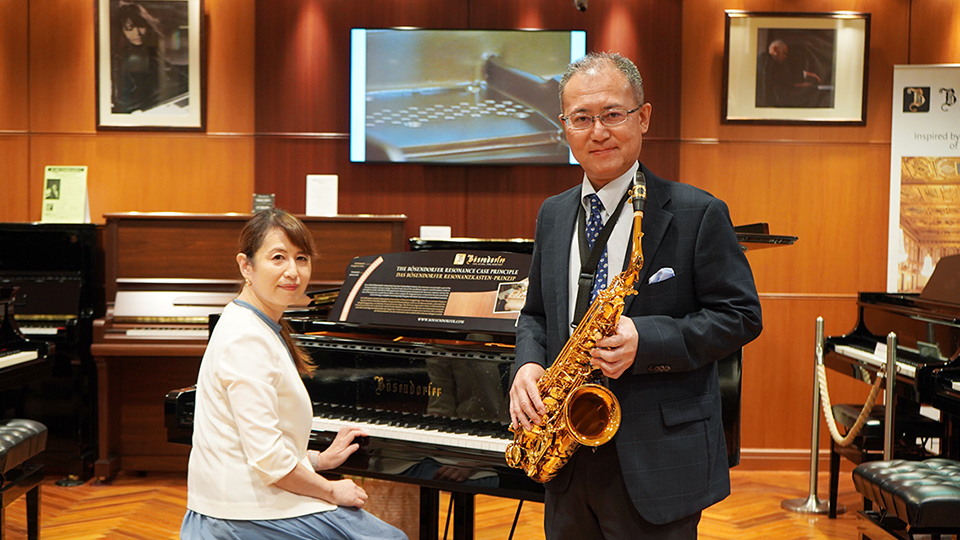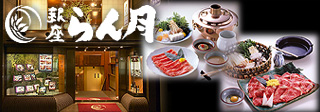
CSR・CSV

Ginza×CSR・CSV Vol.34 Yamano Music
200年の歳月を見据え、「音楽のある豊かな暮らし」を日本へ
2019.10.15
”Ginza×CSR・CSV” Vol. 34 will introduce Yamano Music Co. Ltd. Established in 1891. Yamano Music continues to engage in a variety of business operations, including selling musical instruments and music software, running music classes, and organizing and holding music events under their corporate mission to “contribute to society through promoting music.” In this edition, we interviewed Mr. Atsushi Furuta, Director and General Manager of Sales Headquarters/ Music School Business Department, and Ms. Yumiko Sunaga, Executive Officer and Manager of the Public Relations Office / Sales Promotion and Marketing Office.
“Music crosses borders” Keeping in mind the founding spirit
- ─ Established in 1892 (Meiji 25), Yamano Music continues to pass down the founder’s belief that “music in a universal language that can connect people.”
- Furuta:
This philosophy originated in our founder Seitaro Yamano’s experience on board the ship bringing him home from his studies in the United States. He was inspired to witness how instrumental entertainment, or the power of music, let people overcome their differences and brought together people of different races speaking different languages. Back in those times, music was a luxury enjoyed by the privileged and was considered to be inaccessible by common people.
Our founder manufactured and seold organs and pianos at Matsumoto Music, the predecessor of Yamano Music, and later became representative of Yamano Music, which inherited the business. The company has made tremendous efforts to reconstruct its business after its corporate building was destroyed in war and the Great Kanto Earthquake,
After World War II, in 1957, Yamano Music opened an organ class and hosted a classroom of Yamaha Music School. Following a period when LP and CD sales surged, the company expanded its musical instrument retail operations to cover wholesale operations as well. In 1998, it opened Japan’s first music school targeting adults (Yamano Music Salon) in Yurakucho. Yamano Music has also opened stores in shopping malls and department stores in the suburbs and other areas where music has yet to become a part of people’s daily lives.

Encounters with music connect people.
- ─ As a way of “social contribution through promoting music,” Yamano Music has hosted a jazz contest since the 1970s.
- Furuta:
Our previous president, Masamitsu Yamano, the third president of our company was very enthusiastic about supporting student big band jazz bands and launched an event to offer a place to expose student bands to professional musicians. The event initially took the form of a concert but latershifted to a competition called Yamano Big Band Jazz Contest from its fifth year, and has now developed into a student band “Koshien (national finals for high school baseball),” full of energy.
This year, the event celebrated its 50th anniversary, with a cumulative count of 40,000 participants. I was also a contestant forty years ago, and with my child also being a recent participant, I have achieved two generations of participation.
The contest is known by the name “YAMANO,” and many people learn about Yamano Music through this contest. More than one hundred contestants have become professional musicians, so I am sure that we have more or less contributed to the development of the Japanese jazz scene.
In 2015, we hosted the First Yamano Big Band Jazz Festival. This event has become an opportunity for past contestants of YAMANO as well as those who missed the chance to compete when they were young to play. President Masahiko Yamano claims the event will be continued for at least one hundred years, implying that he wishes to pass it down to future generations.


Celebrating the 50th anniversary of the Yamano Big Band Jazz Contest, we also held special events including Yamano Jazz,
welcoming the participation of a wide range of age groups from elementary school children to adults.
- ─ Creating opportunities for people to get to know musical instruments lead to connecting people’s hearts.
- Furuta:
The “Musical Instrument Fair” held biennially at Tokyo Big Site is the largest exhibition in Japan targeting consumers led by President Yamano. We also took part in the Hibiya Music Festival that was launched this year as one of Hibiya Park’s commemorative events.
The Hibiya Music Festival was launched under the initiative of music producer Seiji Kameda. In two days, 100,000 people, including many who do not listen to or play music every day, came to the event, which offered free concert tickets by lot and an area welcoming anyone who wanted to try playing a musical instrument.
Sunaga:
We employees of Yamano Music love music ourselves and share the hope for more people to enjoy playing instruments and listening to live music. At the Hibiya Music Festival and the Jozenji Street Jazz Festival, we have organized a Swing Carnival where we distribute musical scores on the spot and invite everyone to join jam sessions. We lend our hand in hosting events where everyone can enjoy music together regardless of experience.
Of course, our company sells musical instruments as a business, but even laying sales promotion aside, we hope to let more people know that music can make people happy. We want people who are interested in starting music but are reluctant to take the first step to know that it is not as difficult as it seems and that music will enrich their lives and souls.


The Hibiya Music Festival, for which Yamano Music was a special sponsor, invited many people to play musical instruments and listen to live music
Supporting the enrichment of life and expanding the potential of music
- ─ Would you say that music has culturally taken root in Japan, compared to the times of the company’s establishment?
- Furuta:
I have been told that our founder said that “it would take at least 200 years for Western music to become fully established in Japan.” We have been in business for 127 years, so that means it will take another 73 years for Western music to truly take root in Japan.
It is true that the world is full of music, but I find that most people are interested only in the trends. The music that the mass media focuses on as well as the range of music played or listened to is very limited. We can say that we have a mature musical culture when each individual knows the music that they feel comfortable with and knows what they like.
According to a questionnaire survey conducted by the Ministry of Internal Affairs and Communications, only one in ten people have touched a musical instrument in a year.
Japanese society has relied on school education to educate people in music, but schools are offering fewer music classes and extracurricular activities focused on music. Encouraging people to play not only in the school brass band but also to join citizens’ bands and community-based music activities could lead to activating local communities.

Planning and creating unique local products, such as Sendai’s “Sasakama Guitar”
can attract a wider audience to bring music into their lives.

- ─ What are some values that you would hope to continue to lay importance on?
- Furuta:
Our “Corporate Voice” is “Be happy with music,” and we hope that once we meet a customer, we can continue to support the further enrichment of their lives through music.
Recent studies have revealed that playing an music instrument stimulates the brain and can effectively prevent Alzheimer’s disease. With Japanese society aging, we feel that it is our mission to address this issue.
I would like to offer opportunities at public facilities where senior citizens can casually find joy in playing musical instruments, by introducing simple instruments, such as recorders, keyboard harmonicas and ocarinas, which they learned how to play when they were in elementary school. It would be wonderful if we could also send instructors to these forums. - ─ Before we close, please offer a few words about how you feel about Ginza.
- Sunaga:
I feel that we are very privileged to be able to continue to run a culture-oriented business in Ginza, historically home to sophisticated arts and cultured.
Furuta:
We will continue to evolve with changing times and in step with the development of Ginza. We are determined to maintain the quality of the service we offer to our customers and to strive to reach even higher levels.
- Please refer to the corporate website for further information.
- Yamano Music Co., Ltd. https://www.yamano-music.co.jp

Director and General Manager of Sales Headquarters/ Music School Business Department,
Atsushi Furuta
Furuta played in a big band jazz band as a student and participated in the Montreux Jazz Festival. A contestant in the Ninth and Tenth Yamano Big Band Jazz Contest (YBBJC), Furuta was offered a job at Yamano Music in 1981. He assumed his current position after experiencing overseas sales and marketing, musical instrument retail, and the music school business. He also directs the YBBJC headquarters since 2014.
Executive Officer and Manager of the Public Relations Office / Sales Promotion and Marketing Office
Yumiko Sunaga
In 1985, Sunaga joined Seibu Department Store, where she was in charge of planning culture school classes and store sales promotion. She joined Yamano Music in 2007 and after working in sales promotion and web marketing, she became Manager of the Digital Marketing Office (currently Sales Promotions and Marketing Office) in 2015 and also Managerof the Public Relations Office in 2016. She was appointed Executive Officer in 2018. She spends here weekends playing keyboard in a “big buddy” band
Writer
Having worked for several foreign IT firms, Imai shifted the target of her work to environmental and social issues after participating in the tenth meeting of the Conference of the Parties (COP 10) to the Convention on Biological Diversity as an NGO member. She currently conducts interviews, edits and writes articles, develops educational programs and offers interactive counselling sessions.
Makiko Imai
alternaHaving worked for several foreign IT firms, Imai shifted the target of her work to environmental and social issues after participating in the tenth meeting of the Conference of the Parties (COP 10) to the Convention on Biological Diversity as an NGO member. She currently conducts interviews, edits and writes articles, develops educational programs and offers interactive counselling sessions.
Written by: Makiko Imai/ Planned and edited by: alterna
All List
- Ginza×CSR・CSV Vol.39 Oris Japan
- Ginza×CSR・CSV Vol.38 MOTHERHOUSE
- Ginza×CSR・CSV Vol.37 CITIZEN
- Ginza×CSR・CSV Vol.36 LOFT Ginza
- Ginza×CSR・CSV Vol.35 Ginza Natsuno
- Ginza×CSR・CSV Vol.34 Yamano Music
- Ginza×CSR・CSV Vol.33 BRITA Japan
- Ginza×CSR・CSV Vol.32 ITOYA
- Ginza×CSR・CSV Vol.31 UNIQLO Ginza Store
- Ginza×CSR・CSV Vol.30 GINZA SIX Retail Management
- Ginza×CSR・CSV Vol.29 Ginza Kimuraya
- Ginza×CSR・CSV Vol.28 Lond
- Ginza×CSR・CSV Vol.27 cafe 634
- Ginza×CSR・CSV Vol.26 Ginza Cave Fujiki
- Ginza×CSR・CSV Vol.25 TBM
- Ginza×CSR・CSV Vol.24 Ginza West
- Ginza×CSR・CSV Vol.23 Ginza Sayegusa
- Ginza×CSR・CSV Vol.22 Ginza Tomato
- Ginza×CSR・CSV Vol.21 Kuipo Co., Ltd.
- Ginza×CSR・CSV Vol.20 Seiko Holdings
- Ginza×CSR・CSV Vol.19 SAPPORO LION
- Ginza×CSR・CSV Vol.18 Ginza Grand Hotel
- Ginza×CSR・CSV Vol.17 Isetan Mitsukoshi LTD Mitsukoshi Ginza Store
- Ginza×CSR・CSV Vol.16 Ginza Social Film Festival
- Ginza×CSR・CSV Vol.15 Yarakasukan
- Ginza×CSR・CSV Vol.14 Hakutsuru
- Ginza×CSR・CSV Vol.13 Swan
- Ginza×CSR・CSV Vol.12 Ginza Tanagokoro
- Ginza×CSR・CSV Vol.11 Mikimoto
- Ginza×CSR・CSV Vol.10 Novarese
- Ginza×CSR・CSV Vol.9 Sony Building
- Ginza×CSR・CSV Vol.8 Pola Orbis Holdings
- Ginza×CSR・CSV Vol.7 Ricoh
- Ginza×CSR・CSV Vol.6 Chuetsu Pulp & Paper Co.
- Ginza×CSR・CSV Vol.5 ALBION
- Ginza×CSR・CSV Vol.4 Bunshodo
- Ginza×CSR・CSV Vol.3 Recruit Holdings
- Ginza×CSR・CSV Vol.2 Specified Non-Profit Organization Ginza Honey Bee Project
- Ginza×CSR・CSV Vol.1 Shiseido








